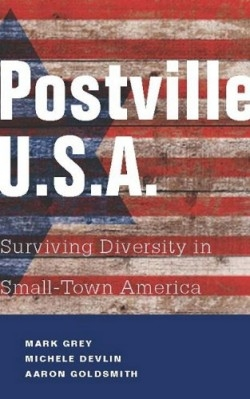Postville, USA
Surviving Diversity in Small-Town America
The sudden downfall of Agriprocessors, the kosher meat processing plant owned by Orthodox Jew Aaron Rubashkin, exposed the maltreatment of both animals and human beings. First, People for the Ethical Treatment of Animals (PETA) released a video showing brutal slaughtering methods that violate both Jewish and civil laws: throats ripped with meat hooks from still-living cattle. Second, a raid of the plant by federal Immigration and Customs Enforcement (ICE) agents led to the detainment of hundreds of illegal immigrant workers and shocked the public with allegations of unsafe working conditions, child labor, unpaid labor, illegally low wages, and the systematic verbal and sexual abuse of workers. These events left twenty percent of Postville, Iowa’s population behind bars and virtually halted the town’s economy. Now, as Agriprocessors’ owner sits in jail, the town struggles to survive.
This book focuses on the complex social microcosm that Postville became “when people from thirty-five different countries converge[d] on an isolated town of 2,000 people and decide[d] to call each other ‘neighbor.’” Thrown together because of the plant, Postville natives and newcomers worked together to create a multicultural community that, for a short time, was a model of how Americans can overcome the challenges posed by diversity. After the ICE raid, Postville residents repeatedly welcomed new groups of immigrants lured by the promise of employment. As each group became disenchanted with Agriprocessors’ low pay and arduous working conditions, Postville residents rallied, providing housing, power, and even clothing to help the displaced.
The authors detail how Agriprocessors’ treatment of workers was worse than that of the meat packing industry in general. They also discuss how local community activists organized a food bank and other services to supplement the low wages of employed plant workers, and they warn against the dangers small towns face when they try “to recruit and serve too many immigrants” before developing the infrastructure to meet their needs. Finally, they argue that American immigration policy hampers its changing economy and multicultural project with draconian laws that impede its adjustment to “the new economic realities of globalization.”
This impressive collaboration draws on the fields of refugee health, applied anthropology, business, and Jewish studies. Its even-handed approach to the sensitive nature of how members of one community exploited members of another is commendable and diligent. One of the authors lives in Postville, and the other two have extensive ties to its community. The book, clearly a labor of love, combines professional and academic expertise with a heartfelt wish that Postville recover from this most difficult blow.
Disclosure: This article is not an endorsement, but a review. The publisher of this book provided free copies of the book to have their book reviewed by a professional reviewer. No fee was paid by the publisher for this review. Foreword Reviews only recommends books that we love. Foreword Magazine, Inc. is disclosing this in accordance with the Federal Trade Commission’s 16 CFR, Part 255.

